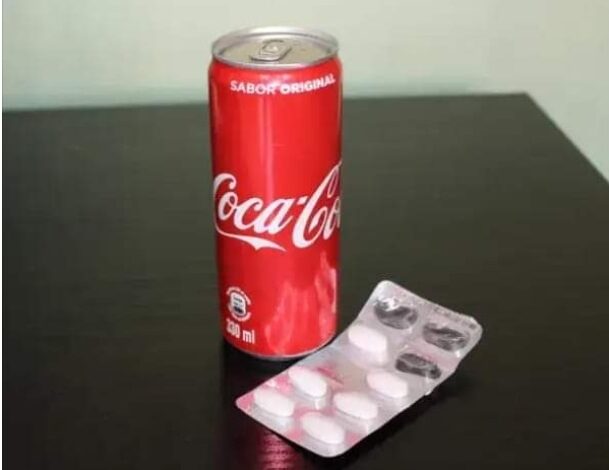Fact-Check: No Proof! Panadol and Carbonated Drinks Do Not Cause Instant Death

BY: Mustapha Lawal & Ibraheem Muhammad Mustapha
Claim
A mixture of panadol and carbonated drinks causes instant death.

Verdict
Insufficient evidence. There is no verifiable evidence or data to support the claim that consumption of a mixture of Panadol with carbonated drinks can lead to a poisonous death.
Full Text
A recurring piece of information circulates that a combination of Panadol and carbonated drinks [like Coke, Fanta and Maltina] is deadly and highly harmful to health.
Our disinformation team at FactCheckAfrica monitored the claim and saw it on WhatsApp, Facebook, X (formerly Twitter) and multiple blogs.
The message begins with the news of the purported death of an individual from Lagos State. “WARNING NOTICE. A young politician in Lagos State from Ikeja LGA died at LUTH just because of his addiction to carbonated drinks. He died shortly after taking Panadol with 7up,” part of the message alleged
Also, it comes with a nudge to share to briskly save somebody’s life from imminent danger. “An investigation was carried out and it was discovered that PANADOL with a drink that has GAS (carbonated) changes into POISON.”
The broadcast also has a list of names, suggesting that the listed names endorsed the message. The listed names claimed to be representatives of the Lagos NMA (Nigeria Medical Association) are Dr Awofolaju Olubode, Dr Johnson Olusegun, Dr Babafemi Thomas, Dr Kunle Ajayi, Dr Okafor Chukwuma and Dr Fashina Azeez.
Our campaign against information pollution in West Africa prompted FactCheckAfrica to conduct this verification in a bid to ascertain the truth.
Background
What is Panadol?
Panadol is a drug that belongs to the generic name group: Acetaminophen and it is usually used to treat moderate pain (from headaches, menstrual periods, toothaches, backaches, osteoarthritis, or cold/flu aches and pains) and to reduce fever according to WebMD, a global health platform.
Acetaminophen works by blocking the production of prostaglandins, which are chemicals that cause pain and fever. Although research has shown that it can cause liver damage if taken in excessive amounts or for extended periods, it is generally considered safe and effective when taken in recommended doses.
What are Carbonated drinks?
The Conversation published that Mr Michael W. Crowder, a professor of Chemistry at US-based Miami University, noted that carbonated drinks are beverages that contain dissolved carbon dioxide– CO₂ – gas into a liquid. The pressure released during this carbonation process results in a hissing sound which creates the fizz or bubbles in the drink. Carbonated drinks come in many forms, including soda, sparkling water, energy drinks, and flavoured seltzer water. Some popular examples of carbonated drinks include 7up, Coca-Cola, Pepsi and Sprite.
Carbonated drinks are widely consumed globally, and their popularity continues to grow. They are often enjoyed for their refreshing taste, convenience, and social appeal. However, excessive consumption of carbonated drinks has been linked to various health issues, such as tooth decay, osteoporosis and an increased risk of obesity and type 2 diabetes.
Verification
In an advanced Google Search, FactCheckAfrica found a disclaimer published and signed on 31/08/20 by Dr Badmus Adeola, the Lagos NMA Publicity Secretary, saying the association dissociated itself completely from the claim and said it has nothing to do with it.
The statement reads, “The attention of the NMA Lagos SOC had been drawn to a purported write-up on PANADOL and gaseous drinks with the culprit inserting names of some of our members as originators of such frivolous write-up. This is to inform the public that none of those doctors have anything to do with this write-up and the content of the write-up is UNVERIFIED!!!” Additional research carried out by our team found no results to validate the claim.
According to scientific studies reviewed by FCA, caffeine is said to be the main active ingredient in carbonated drinks. According to WebMD, caffeine is a natural chemical with stimulant effects. It works by stimulating the central nervous system, heart, muscles, and the centers that control blood pressure.
Caffeine can be found in food, beverages, analgesics, and over-the-counter products. Panadol and other tablets are also said to contain caffeine, and depending on the method of extraction, the amount of caffeine in tablets varies. For instance, a study published in the Bayero Journal of Pure and Applied Sciences found that the percentage of caffeine using only water as the extraction solvent in the three different tablets; ibuprofen, boska, and Panadol extra were 7.40%, 5.60% and 4.60% respectively. While the percentage of caffeine using both water and chloroform in three tablets was 7.40%, 5.50% and 5.22%.
Typically, over-the-counter supplements designed for fatigue relief are said to contain around 100-200 mg of caffeine per tablet. Similarly, prescription drug formulations are said to have doses ranging from 32 to 200 mg of caffeine as part of their composition.
Excessive consumption of caffeine has been linked to acute caffeine intoxication, which in turn results in tachycardia, vomiting, cardiac arrhythmias, seizures, and in rare cases, death. A 2017 study however noted that although it poses health risks, the acute and long-term effects resulting from excessive and chronic consumption of other additives alone and in combination with caffeine are not fully known. Another 2017 study that examined caffeine concentrations in postmortem blood from 51 caffeine-related poisoning deaths found that the deceased had ingested caffeine in tablet or powder form and it does not seem likely that toxic concentrations of caffeine can be achieved from over-consumption of caffeinated beverages alone.
Conclusion
Following our check, we can confirm that there is no verifiable evidence or data to support the claim that consuming Panadol with a carbonated drink turns into poison and can cause instant death. Additionally, a medical association it was linked to has originated from have debunked it as spurious.




